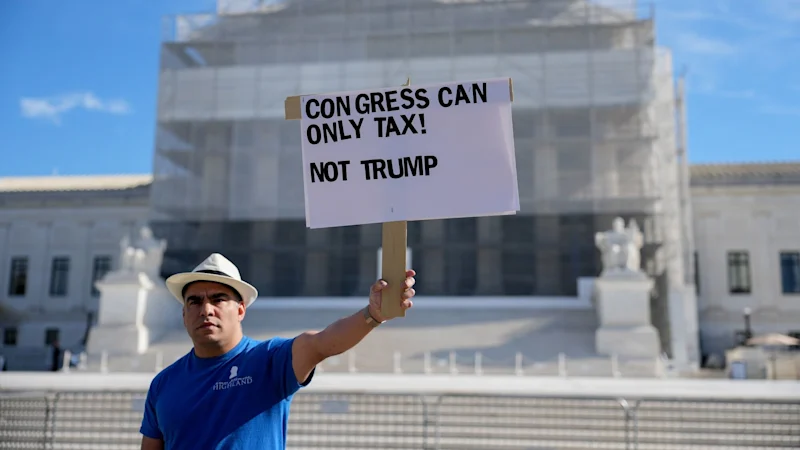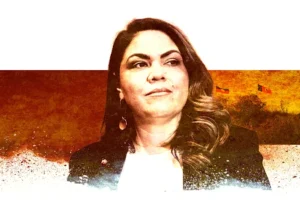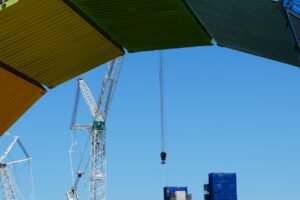
Alan Wolff, a former deputy director-general of the World Trade Organisation, now a senior fellow at the Peterson Institute for International Economics, said there was no clear outcome.
“Points were scored on either side,” he said. “It clearly troubled the justices to have that much power transferred (to the president) without that much thought apparently given to it.”
Wolff said it was possible the court would rule some tariffs legal – such as those designed to punish countries for the fentanyl crisis – but decide others were unlawful.
Solicitor-general John Sauer, acting for the administration, told the court the president enjoyed a “sweeping delegation of authority from Congress” under the emergency laws, and that by giving him power to regulate importation, Congress “is naturally conferring the power to tariff”.
Barrett posed several sceptical questions, asking for any example of where the Congress had used the phrase “regulate importation” to confer the power to impose tariffs.
When Sauer referred to certain cases, Barrett said: “None of those cases talked about it as conferring tariff authority.”
At one point, a liberal justice, Sonia Sotomayor, interrupted: “Could you just answer the justice’s question?” Sotomayor went on to ask why, in relevant codes, Congress had otherwise used the term “regulate and tax”, implying that regulation was separate from taxation.
Sauer said the tariffs should not be seen as taxes. “It’s the power to regulate foreign commerce. These are regulatory tariffs; they are not revenue-raising tariffs. The fact that they raise revenue is only incidental.”
Chief Justice John Roberts, a moderate conservative appointed by then-president George W. Bush, took issue with that assertion, pointing out that the government boasted about tariffs reducing the budget deficit.
“I would say that’s raising revenue, domestically,” he said.
Donald Trump boarding AIr Force One on Wednesday to fly too Miami to address the America Business Forum.Credit: AP
Roberts also queried the government’s argument that Trump’s authority derived from his broad powers to make decisions about foreign affairs.
“Of course, tariffs are dealings with foreign powers. But the vehicle is imposition of taxes on Americans, and that has always been the core power of Congress,” he said.
However, Roberts also questioned the challengers’ lawyer, Neal Katyal, pointing out that while tariffs were certainly a tax, they were a foreign-facing tax that Trump had wielded on the world stage.
“One thing is quite clear: the foreign-facing tariffs were in several situations quite effective in achieving particular objectives,” Roberts said. “It implicates very directly the [president’s] foreign affairs power.”
Protesters outside the court.Credit: AP
Katyal conceded the tariffs had foreign policy implications but argued the country’s founders had exclusively committed that power to Congress.
He told the court that beyond the legal doctrines at play, the case came down to common sense. “[Tariffs] take dollars from Americans’ pockets and deposit them in the US Treasury. Our founders gave that taxing power to Congress,” he said. “We will never get this power back if the government wins this case.”
Justice Gorsuch, a Trump appointee, appeared to share those concerns. “It is a one-way ratchet toward the gradual but continual accretion of power in the executive branch and away from the peoples’ elected representatives,” he said while questioning the government.
Loading
Justice Samuel Alito, appointed by Bush, appeared the most sympathetic to the government. He compared the situation to a crowded national park, asking: if Congress passed a law allowing the National Parks Service to “regulate admission” to the park, wouldn’t it naturally allow the NPS to charge a fee?
Katyal said that would be OK if the fee only covered the cost of running the park, but not if it raised revenue.
The case has already been expedited, and the Supreme Court is expected to rule on the matter relatively quickly, likely before Christmas.
Trump has described the case as “literally LIFE OR DEATH” for the US. “With a Victory, we have tremendous, but fair, Financial and National Security,” he wrote on social media. “Without it, we are virtually defenseless against other Countries who have, for years, taken advantage of us.”
So invested was Trump in the case that he contemplated attending the hearing in person. But he instead flew to Miami to deliver the keynote address at the America Business Forum on the one-year anniversary of his election victory.
While a loss would be a significant setback for the Trump administration, it has other legislative means at its disposal – other than emergency powers – that it could use to reimpose many of the tariffs.
The court was not considering the legality of sectoral tariffs, such as those on steel, aluminium, copper and pharmaceuticals, which were imposed under different laws.
Get a note directly from our foreign correspondents on what’s making headlines around the world. Sign up for our weekly What in the World newsletter.





